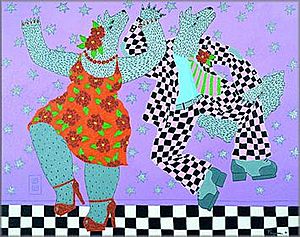Harry Fonseca facts for kids
Quick facts for kids
Harry Fonseca
|
|
|---|---|

Pow-Wow Club (1981) by Harry Fonseca, acrylic and glitter painting on canvas
|
|
| Born |
Harry Eugene Fonseca
January 5, 1946 |
| Died | December 28, 2006 (aged 60) Albuquerque, New Mexico, U.S.
|
| Nationality | Shingle Springs Rancheria, American |
| Education | Sacramento City College, California State University, Sacramento |
Harry Eugene Fonseca (1946–2006) was a talented Native American artist. He was a member of the Shingle Springs Band of Miwok Indians. Harry created many colorful paintings and drawings. His art often showed stories and characters from Native American traditions.
Contents
Harry Fonseca's Early Life and Education
Harry Eugene Fonseca was born in Sacramento, California, on January 5, 1946. His family was part of the Shingle Springs Band of Miwok Indians. He also had Hawaiian and Portuguese family roots.
Harry studied art at Sacramento City College. He then went to California State University, Sacramento. There, he learned from artist Frank LaPena. But Harry soon left college to create art his own way.
Harry Fonseca's Art Journey
Harry Fonseca's first artworks were inspired by his Nisenan heritage. He loved the designs from traditional baskets and dance clothes. He also took part in traditional dances himself. A big part of his art came from the creation stories of his people. His uncle, Henry Azbill, shared these stories with him. Harry painted his Creation Story many times throughout his life.
The Popular Coyote Series
In 1979, Fonseca started his famous Coyote series. Coyote is a clever trickster character from Indigenous California stories. Harry showed Coyote in modern places. For example, his painting Coyote in the Mission shows Coyote wearing a leather jacket. He also has green high-top sneakers. Coyote stands against a graffiti-covered brick wall in San Francisco. Another painting shows Coyote sitting in a cafe in Paris.
Art Inspired by Ancient Rock Art
Fonseca was very interested in petroglyphs. These are ancient drawings carved into rocks. He saw them in the Coso Range in California. He also studied petroglyphs from all over the Western United States. In 1991, he retold the Maidu creation story using these rock art images. He started a series of paintings called Stone Poems. These paintings used many ideas from petroglyphs. Some of these paintings were shown in a museum in Los Angeles in 1989.
Art About the California Gold Rush
Harry Fonseca also made art about the California Gold Rush. This was a difficult time for Native Americans. His paintings from this period have a strong message. They are small, abstract paintings. Gold is the main color. There are also traces of red. This red stands for the blood of Native Americans. It was shed by the gold seekers. Each painting also has minerals from California's gold country. Harry wrote that these paintings show the "physical, emotional and spiritual genocide" of Native people. Many of these works were shown at the Crocker Art Museum in 1992. They were also part of a big Gold Rush exhibit in Oakland in 1998.
Coyote and Rose and Other Series
Harry made many drawings and prints of Coyote. He also created Rose, who was Coyote's female friend. Rose often wore a dress with flowers on it. These characters became very popular. They were often seen on posters for events in Santa Fe.
Fonseca created several other series of paintings. In the 1990s, he painted images of Saint Francis. Saint Francis appeared as an empty space in each painting. Around the same time, he painted a series about the Icarus story. Another series from 2002 was inspired by old Navajo blanket patterns.
From the early 1990s, Harry lived and worked in Santa Fe, New Mexico. In 2003, he began painting abstract flowering tree branches. He called this series Four Seasons. A few of these paintings were shown at the National Museum of the American Indian in New York City.
Harry Fonseca's art was part of important museum shows. His work was in Stretching the Canvas: Eight Decades of Native Painting. This show was at the National Museum of the American Indian. The Autry Museum also had a show called Coyote Leaves the Res: The Art of Harry Fonseca.
Collections of Harry Fonseca's Art
Many museums around the world own Harry Fonseca's artworks. These include:
- The Albuquerque Museum of Art and History (New Mexico)
- The California State Parks Central Valley Regional Indian Museum (California)
- The Crocker Art Museum (California)
- The Denver Art Museum (Colorado)
- The Eiteljorg Museum of American Indians and Western Art (Indiana)
- The Ethnological Museum of Berlin (Germany)
- The Heard Museum (Arizona)
- The Honolulu Museum of Art (Hawaii)
- The Hood Museum of Art (New Hampshire)
- The Linden Museum (Germany)
- The Monterey Fine Arts Museum (California)
- The New Mexico Museum of Fine Art (New Mexico)
- The Oakland Museum of California (California)
- Oguni Museum (Japan)
- The Pequot Museum (Connecticut)
- The University Art Museum (California)
- The Washington State Arts Museum (Washington)
- The Wheelwright Museum of the American Indian (New Mexico)
Harry Fonseca's Passing
Harry Fonseca was diagnosed with brain cancer. He was hospitalized in Albuquerque, New Mexico, in August 2006. He passed away there on December 28, 2006.
 | Delilah Pierce |
 | Gordon Parks |
 | Augusta Savage |
 | Charles Ethan Porter |

